
by Ashe in America | May 20, 2022 | Feature Story Bottom Left
ASHE IN AMERICA
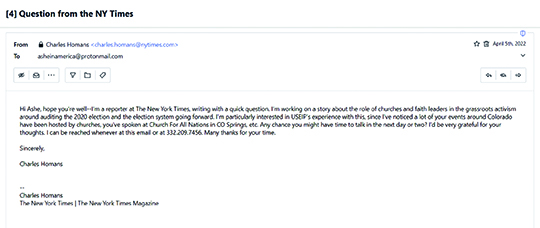 In April, the NY Times published another bit of fiction, “A Crusade to Challenge the 2020 Election, Blessed by Church Leaders.” The piece highlights Colorado’s election integrity activists and offers as a premise: “Some evangelical pastors are hosting events dedicated to Trump’s election falsehoods and promoting the cause to their congregations.”
In April, the NY Times published another bit of fiction, “A Crusade to Challenge the 2020 Election, Blessed by Church Leaders.” The piece highlights Colorado’s election integrity activists and offers as a premise: “Some evangelical pastors are hosting events dedicated to Trump’s election falsehoods and promoting the cause to their congregations.”
Charles Homans, an activist in disguise based on his body of work, reached out to me in April for comment on this piece. He wanted to talk about Colorado churches and the election integrity movement. After reviewing his work, I ignored his four emails.
A Unified Media, Attacking The Church And The People
The Times’ piece demonizes Colorado pastors, who’ve provided their facilities for use by grassroots activists, often for a fee. He conflates this normal business practice of churches everywhere with some sort of apostasy, even claiming, “In the 17 months since the presidential election, pastors at these churches have preached about fraudulent votes and vague claims of election meddling.” (emphasis added)
I’ve been to and spoken at many of these meetings. At no time have we made “vague claims of election meddling.” Rather, we delivered detailed analysis, forensic evidence, expert-generated and peer-reviewed reports that describe in exquisite detail exactly how the fraud is architected and executed, in Colorado and nationally.
Further, since election day in 2020, I have been writing about all this nerdy/technical/detailed evidence to make it consumable and understandable for non-technical audiences. I have been called many things, but vague would be new. I try to paint a vivid picture for my readers, and I always provide receipts. Homans should go read up at asheinamerica.com.
In early May, The Denver Post — never one to rely on original reporting — picked up the Times piece, and further explored the space. Krista Kafer wrote, “Zealous Trump supporters…hope that miraculous proof will surface to support their speculations.”
“Zealous Trump supporters” is a false premise that assumes our efforts are about Trump. Everything after use of this wording can be discarded. She revealed her bias — and so early in the piece!
Homans ascends pretense. His bias is on full display in everything he writes.
Nationally, election integrity activists expect The New York Times to slander and defame their efforts. Those of us in Colorado certainly expect the same from The Denver Post and their family of local leftist mockingbirds. These published opinions aren’t truth. They’re bought and paid for narratives, brought to you by the political establishment. They’re basically ads.
While the Times and the Post focus on attacking Colorado churches and their pastors, both outlets — and the majority of other “news” outlets — are ignoring the real story.
For Jena, Unity Means Unity Colorado’s
Three Government Branches
The passage of Griswold’s “Colorado Election Security Act” (SB22-153) transfers election oversight from the local counties to the state, with the original draft aiming to criminalize criticism of the doe-eyed Secretary.
Over in the Judiciary, Griswold neutralized the threat of Elbert County Clerk Dallas Schroeder, an honest public servant who complied with a court order to hand over the Elbert County 2020 forensic images of the Dominion machines. She now holds all the cards from Elbert County, though she continues to press for the names of those involved. No loose ends can be tolerated.
On Tuesday, May 10, a Mesa County Court Judge ruled to remove Clerk Tina Peters as the Designated Election Official for Mesa County. Peters has been repeatedly vindicated by multiple peer-reviewed reports, including three Mesa Forensic Reports, the Antrim Audit Report (December 2020), the Maricopa Audit Report and, most recently, the preliminary findings from Otero, NM.
Yet, despite overwhelming evidence that Griswold is guilty of election crimes (at best) and is engaged in a coverup, Clerk Peters is spun as the villain.
Before you blame Democrats for the “balance of powers” achieving mythological status in Colorado, remember that SB22-153 was cosponsored by Republican Senator and Massive Disappointment Kevin Priola. Priola is known for using his taxpayer funded time and resources to draft pillow-related election amendments.
The rest of the Party has been silent on the lawfare, despite the involvement of multiple duly-elected Republicans.
Kind of makes you wonder what Republicans mean by unity.
Ashe Epp is a writer and election integrity activist. Read her work at asheinamerica.com and follow her on Telegram and other socials @asheinamerica.

by Ashe in America | Apr 21, 2022 | Feature Story Bottom Left
 ASHE IN AMERICA
ASHE IN AMERICA
There is a war happening in the Colorado Republican Party. Until now, however, this war has gone unnoticed by right leaning normies and has been largely ignored by the party establishment.
The Colorado election integrity movement brings together scientists, mathematicians, cyber security experts, community organizers, writers, artists, current and former politicians, current and former military, corporate strategists, digital experts, super moms, pastors, prayer warriors, and so many more amazing Coloradans.
Robust, contentious, and deeply critical examinations of what is true are happening all over Colorado, and the number of registered Republicans that question the mainstream election narrative continues to grow.
Until Saturday, April 9, 2022, the Uniparty establishment and their media lapdogs were able to pretend this wasn’t happening. Then came the 2022 Colorado Republican Convention.
The Big Winner: Election Integrity
The lead up to the convention was fiery. Senator Paul Lundeen (SSD9) lost his local assembly vote 48% to 52% to Lynda Zamora Wilson, a retired Air Force Lieutenant Colonel. with four advanced degrees (and who had only been in the race for five days prior to the vote).
Congressman Ken Buck (CD4) was even more humiliated in his local CD4 assembly, when the floor nomination of completely unknown candidate Bob Lewis resulted in Lewis taking 62% of the vote!
But perhaps most notably, Mesa County Clerk Tina Peters — totally vindicated on the evidence despite continued dishonest media — took 61% of the delegates. A vote for Tina Peters is a vote for election integrity, and 61% is a wide margin. During the June 28 primary, Peters will face Pam “ZuckerBucks” Anderson who petitioned onto the ballot. Think of the petition process like this:
“I know the people paying attention in the party don’t like me – and I can’t even convince 30% of them to give me a shot — but I bet I can trick enough of the ones that aren’t paying attention into voting for me.”
Anderson is currently on leave from the Center for Tech and Civic Life, the infamous NGO that allegedly bought the 2020 election. Also, ZuckerBucks Anderson is the establishment’s pick for Secretary of State.
Griswold vs. Anderson. Soros vs. Zuckerberg. But Uniparty is a conspiracy theory, right?
People vs. Party vs. People
In the run up to November 3, 2020, many states rushed to change their election laws, often unconstitutionally, allowing access-focused changes that provably resulted in a compromised election.
We didn’t see these law changes in Colorado because they already mirrored existing law. We practically drop mail-in ballots from the sky during election season, in the name of “access.”
And the Colorado Election Security Act (SB22-153), Secretary Griswold’s flagship legislation that is now making its way through the legislative process, ensures such practices will continue.
The inappropriately named bill does nothing to secure elections; rather, this bipartisan piece of legislation — co-Sponsored by RINO Senator and massive disappointment Kevin Priola — seeks to punish anyone who questions the integrity of Colorado elections.
It is a redistribution of power and oversight from local county jurisdictions to the Secretary of State, and the bill also removes existing checks on state power through clever language changes. During Committee discussion on April 18, 2022, Democrats held up both Matt Crane of the Colorado County Clerks Association and Republican Party Chairwoman Kristi Burton Brown as examples of bipartisan support for the bill.
It’s unclear if the Committee Chair could find two more perfect examples of Uniparty Republicans, or if his comments were an intentional troll for the audience. Likely the latter.
How Low Can We Go?
While the General Assembly dives headlong into authoritarianism — in both rhetoric and law — it’s important to remember that their reasons for doing so are entirely political.
The majority, led by Griswold, want to criminalize the actions of whistleblower and rival candidate Tina Peters. It’s notable that while, rhetorically, Peters is called a criminal, the assembly needs to move quickly to make her 2021 actions an actual crime. Clerk Peters did nothing wrong.
The minority party’s opposition is also political. Republicans have been silent on elections for over 500 days, but now it’s an election year and this is a safe, albeit symbolic, vote. It’s little more than the empty rhetoric they usually offer, though certainly they will campaign on their vote “for election integrity!”
Thankfully, the people are no longer buying it. More and more Coloradans, including the proudly unaffiliated, are awakening to Uniparty corruption and demanding a return to our civic principles – and to sanity. For the establishment, their message is clear:
Stand and fight — for Colorado and for the Republic — or get out of the way.
Ashe Epp is a writer and election integrity activist. Read her work at asheinamerica.com and follow her on Telegram and other socials@asheinamerica.
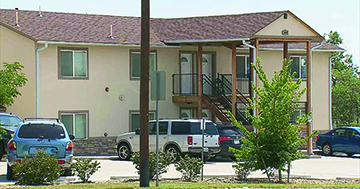
by Ashe in America | Feb 19, 2021 | Travel
by Robert Davis
“It’s wild to think that if Full House was filmed in Denver, then Joey could get evicted,” one Denver resident said as City Council approved a controversial text amendment to its zoning code.

Group Living: The 200-page Group Living Amendment was passed at the nearly 7-hour long February 8, 2021, meeting of the Denver City Council by an 11-2 margin. The amendment expands the number of unrelated adults allowed to live in a single-family home up to five.
Known as the Group Living Amendment, it expands the number of unrelated adults allowed to live in a single-family home up to five, bringing Denver’s group living ordinances in line with cities like Telluride, Aspen, and Colorado Springs.
Senior City Planner Andrew Webb, who sponsored the 200-page amendment, described it as “a move away from current regulations that prohibit or are obstacles to providing care for our most vulnerable residents, and from exclusionary regulations of the past that relegated certain people to industrial parts of the city that often border our poorest communities.”
The amendment passed by an 11-2 margin at the February 8, 2021, City Council meeting. Councilmembers Amanda Sawyer (District 5) and Kevin Flynn (District 2) voted against it. 1,143 written comments were submitted prior to the vote. 619 comments were in support and 524 were in opposition.
Groups such as Neighborhood Coalitions of Denver, All In Denver, and YIMBY Denver supported the amendment. Many single-family homeowners and several registered neighborhood organizations (RNO) vehemently opposed it.
During the nearly eight hour public hearing, several residents voiced opposition to increasing density through congregate living in Denver’s single-family neighborhoods. They said the amendment will only serve to decrease property values, increase crime, and destabilize neighborhoods.
Supporters described the amendment as a first step, but argued some of compromises made by City Council leading up to its passage made the amendment needlessly watered down.
One compromise was continuing the prohibition of community corrections facilities in single-family, multifamily, and row house districts. The amendment also restricts large residential care facilities to parcels of land used for civic, public or institutional purposes. Examples include unused churches, schools, and government buildings.
Other supporters told stories of how living afoul of Denver’s current prohibitions on unrelated adults living together helped them overcome adversity or youthful mistakes. Some had lived in community corrections or residential care facilities and had grown up to become homeowners.
“This issue is bigger than the cars parked on the street. It’s about our neighbors; the people who live in our communities. We need to start supporting our neighbors, even the ones who don’t look like us,” said Kiera Jackson, who lives in Montbello.
Mary Coddington, who works with local housing group Neighborhood Development Collaborative, said cities with similar policies like the Group Living Amendment haven’t seen the rising crime rates or lower property values that opponents suppose.
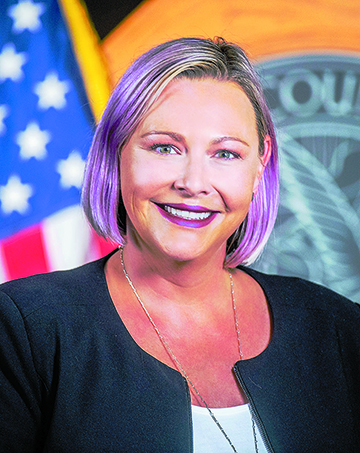
Denver City Councilmembers Amanda Sawyer (District 5) and Kevin Flynn (District 2) voted against the Group Living Amendment at the City Council meeting on February 8, 2021.
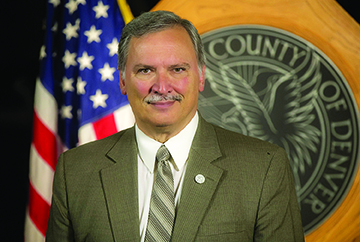 “Denver is really far behind most cities when it comes to common sense group living policies,” she said. “Expansion of areas where community corrections and residential care facilities really need to happen. These facilities are designed to help people get on their feet and reenter communities. But, these efforts are undercut if they’re still segregated away from residential areas.”
“Denver is really far behind most cities when it comes to common sense group living policies,” she said. “Expansion of areas where community corrections and residential care facilities really need to happen. These facilities are designed to help people get on their feet and reenter communities. But, these efforts are undercut if they’re still segregated away from residential areas.”
For business owners like Gail Lindley, who owns Denver Book Binders, the amendment could have large implications on their property taxes. The amendment essentially unlocks potential land uses in several parts of the city, thereby guaranteeing a steeper property tax bill in the near future.
Denver Book Binders sits on a nearly 10,000 sq. ft. lot. In 2009, the company paid nearly $13,000 in property taxes, according to Lindley. By 2019, that bill had ballooned to over $55,000.
“To me, this proposal just sucks.” Lindley told the Glendale Cherry Creek Chronicle. “It was passed under the cover of night and nothing was known about who was making decisions until the Mayor’s office was sued.”
In August 2020, Denver resident Florence Sebern filed a Colorado Open Records Act request with the Mayor’s Office requesting information about the Group Living Advisory Committee, a 40-member committee comprised of developers, neighborhood representatives, city officials, nonprofit and business leaders.
The Mayor’s Office initially denied the request. After a lengthy court battle, a District Judge ruled Sebern was entitled to the records. They revealed only eight members of the committee represented neighborhoods, and that 85 percent of the group members stood to profit from the amendment, Sebern said at the public hearing.
“For the last two or three years, only a handful of individuals were making decisions for others,” she added.
Following the vote, Councilwoman Sawyer released a statement saying she supports updating Denver’s definition of household to reflect the way people are already living in the city. However, she couldn’t see her way to the residential care “side” of the law.
“I agree with the vast majority of the residents who reached out to our office over the past few weeks to advocate against these zoning code changes because these changes are not thoughtful… However, I don’t believe the issues with the residential care ‘side’ of the law were adequately addressed,” she said.

by Ashe in America | Feb 19, 2021 | Main Articles
by Robert Davis

They’re Back: Jason Lewiston, whose Green Flats project was defeated in 2018, is back proposing a project called The Holly Street Townhomes. Also pictured is Anna DeWitt, who owns one of the homes being sold to make way for the new development.
A proposed development on S. Holly Street in Denver’s Hilltop neighborhood is reviving old baggage between neighbors who don’t want change and a developer with leverage to muscle.
Known as The Holly Street Townhomes, the project will combine five parcels between 219 and 227 S. Holly to create a multi-family, co-living complex. Each of the six townhomes contains four individual units which are sold as “shares” of the group home. The units are priced at $150,000 for about 600 sq. ft. for a bedroom, kitchenette, bathroom, and sitting area.
Florence Sebern, who lives in the neighborhood, said the Townhomes are eerily familiar to the Green Flats project her neighbors defeated in 2018. Through an intricate petitioning process, residents were able to force City Council to require a supermajority of 10 votes to pass the necessary rezoning request.
After only eight Council members voted for the project, developer Jason Lewiston told Denverite the setback was a “metaphor for the future of Denver. Are we going to retain whites-only, single-family zoning … or are we going to get past race-based zoning from the 1960s?”
Now that Lewiston is back, this time on the heels of a controversial overhaul to the city’s zoning code, some residents are feeling blackballed by their elected officials.
“Some people in Denver have a particular disdain for Hilltop residents as white, privileged, and somehow willing to surrender to whatever a developer wants to build,” Sebern told the Glendale Cherry Creek Chronicle in an interview.
Sebern also described the timing of Lewiston’s re-appearance in the neighborhood as “curious.”

Destined For Scraping: These townhomes on South Holly Street in the Hilltop neighborhood would be leveled to make way for a multi-family, co-living complex.
Lewiston formed a co-living agency called The Co-Own Company in June 2020 while the Denver housing market was resting. Research by the National Association of Realtors found the Denver metro area experienced a one-year price growth of one percent over that summer.
Even though the Townhomes currently do not hold a building permit with the city, the units are already listed on the MLS. And since the project could not have been built in Hilltop before the Group Living Amendment passed, Sebern concluded the development plan had to be submitted with some foreknowledge that the amendment would pass.
Sarah Wells, Co-Own’s director of sales, was a voting member of the Group Living Advisory Committee (GLAC) while Gosia Kung, an architect, sits on the Denver Planning Board.
Members of both groups are appointed by the Mayor. GLAC disbanded after the amendment passed and members of the Planning Board are appointed for three-year terms on a volunteer basis. All Planning Board members hold outside employment with other firms, corporations, and nonprofit organizations.
Meanwhile, Denver’s form-based zoning code is designed to create predictable outcomes for developers. All zoning permits must be shown to be consistent with a previously approved Large Development Framework, Infrastructure Master Plan, General Development Plan, Regulating Plan, or Site Development Plan. Furthermore, it cannot “substantially or permanently injure the appropriate use of adjacent conforming properties.”

Inexpensive Homes: The Holly Street Townhome units are priced at $150,000 for about 600 sq. ft. for a bedroom, kitchenette, bathroom, and sitting area.
But, Wells said the neighborhood wasn’t chosen to stir up trouble. Instead, Co-Own wanted to bring the project to Hilltop because of its proximity to downtown, its parks, restaurants, and shops.
“Additionally, the lot we’ve chosen already houses a multi-unit building so it allows us to create a new complex that is similar, will have the same number of units and will blend in well with the surrounding area. The architectural style we’re using is intended to complement established neighborhoods and provide a beautiful place for people to live affordably and earn an ownership stake,” she added in an email.
Hilltop is one of Denver’s most expensive neighborhoods with an average home value north of $1 million, according to Zillow. The proposed Townhomes will sell for a combined $600,000 in total, nearly double what Lewiston was asking for in Green Flats.
Overall, the Townhomes will attract more density to the neighborhood as well. Green Flats was designed to offer affordable options for the families and teachers of nearby Carson Elementary or Hill Middle School. The Townhomes will consume more land which may leave less room for off-street parking.
For teachers like Anna DeWitt, who owns one of the homes being sold for the development and teaches French at North High School, the Townhomes represent a chance for Denver to begin embracing its future.
“The Townhomes offer millennials and middle class workers a chance to build equity through a new type of living,” she told the Chronicle. “This can help a lot of people get out of living paycheck to paycheck. What’s wrong with that?”

by Ashe in America | Jan 22, 2021 | Main Articles
by Robert Davis

Ride Share: CDOT expects rideshare usage to grow by 140% within a decade, potentially resulting in a 50% increase in carbon emissions if current road usage trends stay constant.
Denver resident Brian Fritts nearly died during his last Lyft ride, and a loophole in Colorado’s rules for rideshare companies could force him to pay $173,000 in medical expenses.
Fritts’ driver was involved in a hit-and-run accident on northbound I-25 south of the 6th Avenue exit. First responders found the back of the car — where Fritts was sitting — covered in blood. Doctors told Fritts he was lucky to be alive before outfitting him with a rod and six screws in his neck and fusing five vertebrae.
When Fritts presented both Lyft and the driver’s insurance companies with his claim and medical bills, neither insurer accepted liability. To make matters worse, state law doesn’t require rideshare companies like Lyft and Uber to carry the insurance coverage that would make them bear responsibility for patron injuries.
According to Fritts’ lawyer, Eric Faddis, this must change.
“No reasonable person believes that if they utilize rideshare services and sustain catastrophic injuries as a result thereof, the rideshare company will abandon them, make no efforts to rectify the grievous loss, wash its hands of the tragedy, and go on about their business while their patron’s life is changed forever, leaving the rider with no legal recourse at all,” Faddis told Glendale Cherry Creek Chronicle.
Regulatory Entrepreneurship
Legal scholars Elizabeth Pollman and Jordan Barry argue in the Southern California Law Review that companies like Uber and Lyft are intentionally designed to avoid these insurance hazards.
Known as regulatory entrepreneurship, Pollman and Barry describe the business practice as “a line of business in which changing the law is a significant part of the business plan.” The best known example is Uber.
Uber challenged the notoriously regulated taxicab industry to modernize, according to both Pollman and Barry. And while pundits debated the legality of the business altogether, Uber proved its value in markets like New York and Chicago. Soon thereafter, states scrambled to figure out appropriate regulations.
Different than regulatory arbitrageurs, who mold their behavior to effect favorable regulation, regulatory entrepreneurs try to make their business practices part of the law and “do not necessarily care whether they effect a legal change on a de facto or de jure basis,” according to Pollman and Barry.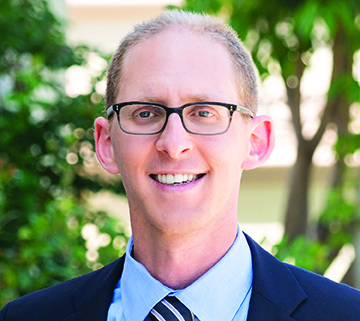
Oftentimes this results in states crafting half-hearted regulations because neither side fully understands the business model.

Legal Scholars: Elizabeth Pollman, above, and Jordan Barry, far right, argue in the Southern California Law Review that companies like Uber and Lyft are intentionally designed to avoid insurance hazards.
Colorado became the first state to regulate rideshares in 2014 and placed the companies under the auspices of the Public Utilities Commission (PUC).
In 2015, the Division of Insurance (DOI) recommended rideshares should carry minimum insurance coverages of $50,000 per auto accident, $100,000 for bodily injury, and $30,000 for property damage — the same requirements as taxicab companies.
DOI made this determination by examining 128 claims involving taxicabs between 2010 and 2012. Of that total, only two claims rose above $100,000 in payments, according to the agency’s report.
However, these recommendations appear devoid of several important considerations, according to Faddis. Chief among them is the oversight to require rideshares to carry Uninsured/Underinsured Motorist’s insurance, which Faddis says could provide injured patrons a “way of putting their life back together.”
“In my opinion, that is a huge legislative gap that places thousands of Coloradans at risk,” Faddis added.
Buying Influence
Regulatory entrepreneurs are also heavily engaged in politics because it is a winning strategy to either effectuate profitable legal change or preserve a favorable regulatory environment, according to Pollman and Barry.
Campaign finance disclosures show both Uber and Lyft have developed strong ties to Colorado’s elected officials, primarily those wearing Blue. However, the companies take different approaches. Lyft seems to prefer campaign donations and lobbying the General Assembly while Uber is absorbed in state issues and PUC regulations.
Of the 208 recorded lobbying activities on behalf of Uber, 90 were directed at PUC, according to the Secretary of State’s office. Similarly, Lyft did not lobby any PUC regulations, but has logged 153 activities on behalf of state legislation.
As for campaign contributions, Lyft has spent $41,775 on state-level campaign and political action committee (PAC) donations since January 2020. Most of the donations went to politicians with ties to the state business, labor, and transportation committees.
Sens. James Coleman (D-Denver), Bob Woodward (R-Larimer), and Kevin Priola (R-Adams), all of whom sit on the Senate Business, Labor & Technology Committee, took money from Lyft. The company also donated to Reps. Dylan Roberts (D-Eagle) and Tom Sullivan (D-Centennial), who are the respective Chair and Vice Chair of the House Business Affairs & Labor Committee.
On the other side, Uber did not spend any money on Colorado campaigns last year. Instead, the company wrote a $15,000 check in support of Proposition CC, which allows the state to keep funds over its annual revenue limit to spend on education and transportation.
However, the Center for Responsive Politics found Uber hired a lobbying firm with strong ties to state lawmakers — Brownstein Hyatt Farber Schreck. In the last 15 years, Brownstein Hyatt has given over $373,000 to local causes, primarily to Democrat-controlled PACs, according to campaign finance data.
Further Measures
While state lawmakers once derided rideshares as a business model that clogs up the roads, they’re now looking to them as a way to reduce overall road usage.
In 2019, the Colorado Department of Transportation (CDOT) calculated road usage by rideshares only accounts for up to 8% of the state’s total. Even so, the agency expects rideshare usage to grow by 140% within a decade, potentially resulting in a 50% increase in carbon emissions if current road usage trends stay constant.
To combat this issue, CDOT recommended lawmakers craft legislation to create a uniform fee schedule and incentivizing the use of electric vehicles among rideshares. Lawmakers have also discussed adding additional fuel taxes and road usage taxes during the 2021 regular session.
However, no discussions have involved closing the insurance loophole that nearly ended Fritts’ life. To Faddis, Coloradans should be aware of the risks they’re hailing when they get in a rideshare.
“These rideshare services need to do the right thing and pay claims for patrons injured as a result of using their services; otherwise, all Coloradans need to know that they are not protected in this scenario and, as a result, using a rideshare service is extremely hazardous,” Faddis said.

 In April, the NY Times published another bit of fiction, “A Crusade to Challenge the 2020 Election, Blessed by Church Leaders.” The piece highlights Colorado’s election integrity activists and offers as a premise: “Some evangelical pastors are hosting events dedicated to Trump’s election falsehoods and promoting the cause to their congregations.”
In April, the NY Times published another bit of fiction, “A Crusade to Challenge the 2020 Election, Blessed by Church Leaders.” The piece highlights Colorado’s election integrity activists and offers as a premise: “Some evangelical pastors are hosting events dedicated to Trump’s election falsehoods and promoting the cause to their congregations.”










